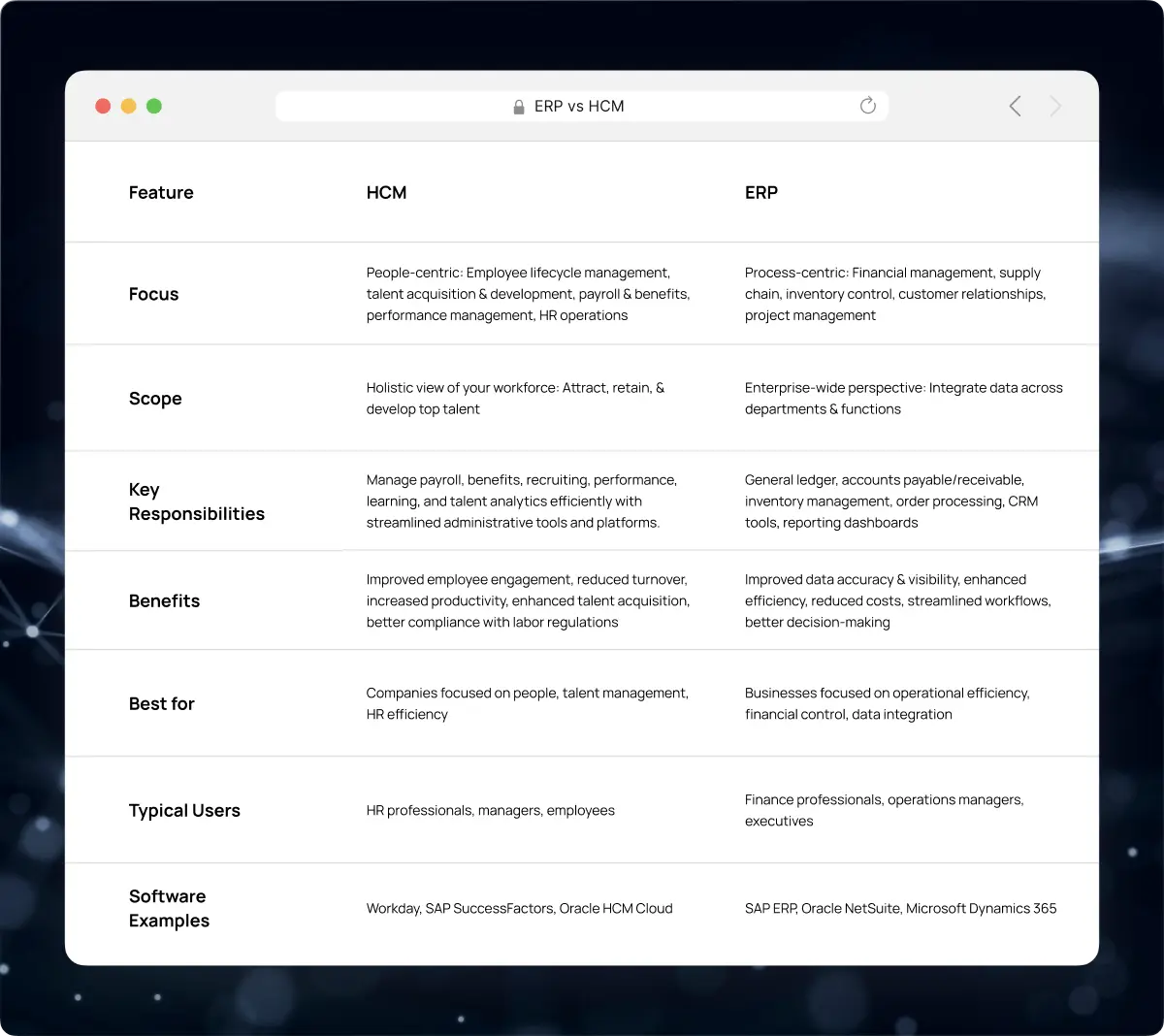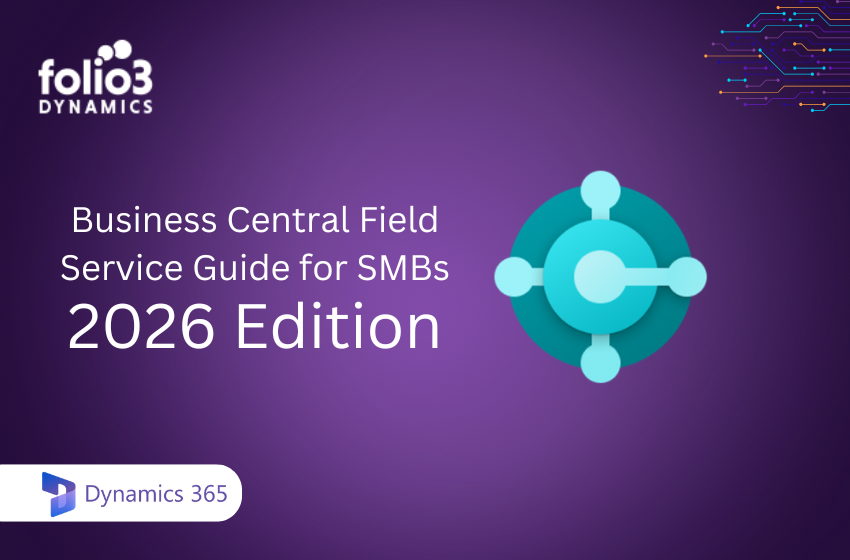You are aware that your organization needs to boost efficiency and better data insights, but due to the numerous acronyms and enterprise software solutions, you are unsure of how to get started.
When choosing an ERP system, enterprise resource planning (ERP) and human capital management (HCM) could stand out as two possibilities to consider (HCM). These two distinct kinds of systems may, at first glance, appear to be quite comparable to one another. On the other hand, a more in-depth examination shows important distinctions that can guide your choice-making process.
We are here to mediate the dispute that has arisen between ERP and HCM. Keep reading to gain further insight into the capabilities and advantages offered by each system, as well as guidance on how to select the platform that will complement your company’s approach most effectively.
ERP vs HCM: The distinction between HCM and ERP systems
Let’s get one thing out of the way: a human capital management system and an enterprise resource planning system are not the same thing. In the end, the way in which they are used is what sets them apart from one another.
Companies that need to integrate their departments in order to share data and procedures frequently utilize enterprise resource planning (ERP) software. It provides assistance to teams in the administration of recurring responsibilities, such as supply chain management, risk management, accounting, and procurement, that are essential to the successful operation of their firm.
On the other hand, an HCM system is comprised of modules that are designed to automate and simplify various facets of human resource management, such as payroll and time management. Both HR administrators and employees who use these technologies for self-service have more efficient procedures as a result of the convergence of these technologies.
The Primary Benefits of Using ERP Systems
Are you contemplating the purchase of enterprise resource planning software? If this is the case, it is extremely important to determine which types of organizations would benefit the most from having access to them.
ERP programs are usually successful in companies that have the following characteristics:
- A business that is growing at a quick rate, requires to scale its operations and automate all of its functional areas.
- Forced to abandon their old ERP systems and adopt antiquated technology, which causes them to suffer in all functional areas (i.e., the 2025 deadline set by SAP).
- The necessity of placing primary emphasis on the satisfaction of customers
- In order to maintain compliance with the regulations, it is necessary to adhere to certain industry standards.
- An ERP system can, in essence, boost an organization’s efficiency as well as its advantage over its competitors. As a result of improvements in operational efficiency, supervisors enjoy increased visibility into every component and aspect of each department’s work.
Bear in mind that businesses that want HCM functionality can discover that an ERP system is a good fit for their needs. When compared to putting HCM capability within an ERP system, adopting a separate human capital management (HCM) system and integrating it with your existing enterprise resource planning (ERP) system or legacy system may be the more realistic option.
The Primary Benefits of Using HCM Systems
It’s possible that certain businesses will discover that an HCM system offers more advantages than an ERP system does. Even if ERP providers insist that you require the full suite of their software, you should still seek advice from an ERP professional who is not biased.
The relatively inexpensive cost of HCM systems is one of the most important advantages they offer. The majority of HCM projects carry a lower level of risk compared to ERP. installations because they require fewer investments and only involve a smaller number of departments.
The HCM functionalities that are incorporated in comprehensive ERP systems may be limited in some ways, although many HCM solutions offer expanded functionality. If you need to communicate with huge international teams that are spread across multiple time zones and locations, this could be useful for you. This benefit is becoming more obvious as an increasing number of workplaces adopt a paradigm in which employees perform their duties exclusively from a remote location.
HCM software, in general, possesses highly developed capabilities for performing fundamental tasks, including payroll, performance management, rehiring, and reskilling employees. Because employees can quickly get the information they need through employee self-service, they save time, which frees up HR and payroll administrators from the snares of manual labor.
Putting the Force of HCM Automation to Work for You
The vast majority of HCM systems that are in use today are cloud-based and have been for some time. Despite the fact that a great number of ERP systems have already made the transition to the cloud, not all of the functionality has been migrated over.
Despite this, many cloud ERP solutions do not include HCM capabilities that are sophisticated enough to enable a full HR transition. Standalone human capital management (HCM) systems, on the other hand, typically offer more specialized capabilities that might assist businesses in attaining digital transformation and a competitive edge. These elements may help enterprises facilitate the digital transition.
What’s better, ERP or HCM? That’s For You To Decide.
When determining which solution would be the best one to meet your requirements, your team should evaluate the aforementioned characteristics. This could assist in guiding your decision.
The straightforward answer is that businesses are able to get advantages in a multitude of areas by implementing both ERP HCM solutions. ERP software may be able to provide you with the tools you require in order to optimize procedures throughout the entire organization and integrate departments. On the other hand, if you are having trouble keeping up with the human resources duties of a staff that is becoming increasingly remote, an HCM solution can assist you.
No matter which option you choose, it is essential to put a solid change management strategy into place in order to guarantee that members of your workforce will embrace the newly implemented software solution. We strongly advise that organizations start the process of change management a significant amount of time before making decisions or putting plans into action.
When you are ready to select an ERP system or begin the process of implementing an ERP system, we encourage you to get in touch with our team so that we can provide you with guidance and assistance. We have extensive expertise in both evaluating and putting into action various HCM and ERP solutions. Submit a request for a free consultation with one of our corporate transformation specialists.



